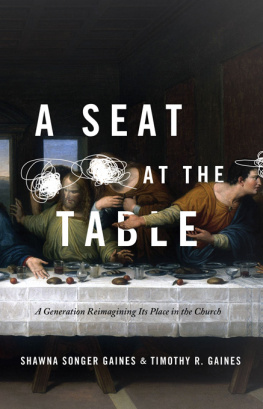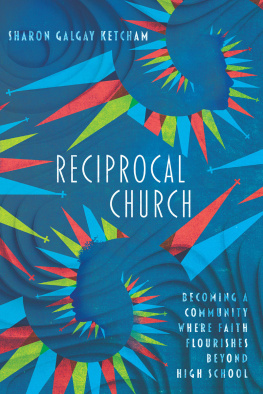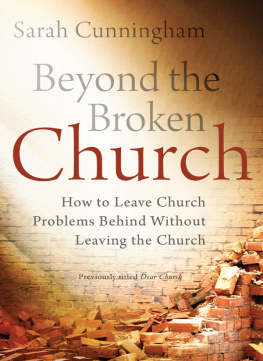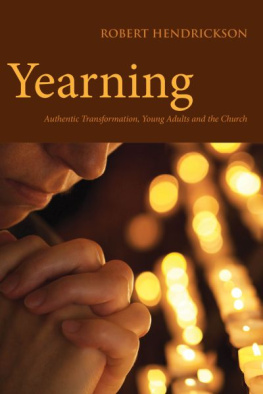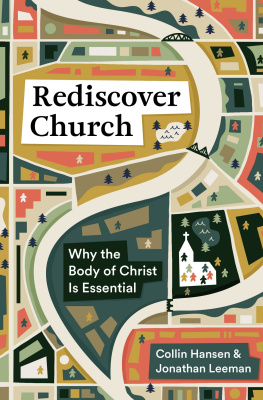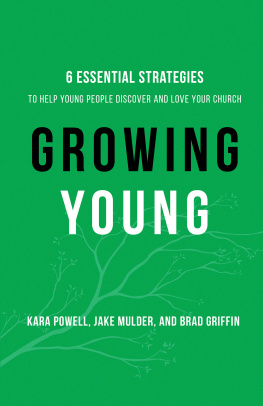

Copyright 2012
by Timothy R. Gaines, Shawna Songer Gaines,
and Beacon Hill Press of Kansas City
2012 eISBN 978-0-8341-2967-2
Printed in the
United States of America
Cover Design: Arthur Cherry
Inside Design: Sharon Page
All Scripture quotations not otherwise designated are from the Holy Bible, New International Version (NIV 2011)Copyright 1973, 1978, 1984, 2011 by Biblica, Inc.TM Used by permission. All rights reserved worldwide.
Library of Congress Cataloging-in-Publication Data
Gaines, Shawna Songer, 1984
A seat at the table : a generation reimagining its place in the church / Shawna Songer Gaines and Timothy R. Gaines.
p. cm.
Includes bibliographical references and index.
ISBN 978-0-8341-2835-4 (pbk. : alk. paper)
1. Church. 2. Intergenerational relationsReligious aspectsChristianity.
3. Church attendance. 4. HospitalityReligious aspectsChristianity.
I. Gaines, Timothy R., 1981- II. Title.
BV640.G35 2012
262.0084'2dc23
2012020112
For our grandparents, who have through their faithfulness given us a seat at the table:
Ray and Joy Bircher
Ray and Evie Gaines
Joe and Geneva McIntyre
Estey and Joyce Songer
CONTENTS

THE FIRST TIME we ever tasted oyster stuffing was at Thanksgiving with some friends. We had been lifelong stuffing traditionalists and were pretty sure that nothing that had once lived in saltwater belonged on the Thanksgiving tablebut when you get together with friends who grew up in different families with different traditions, oyster stuffing is what you get. And really, it didnt matter all that much to us. We loved the company enough to overlook mollusks next to the cranberry sauce.
We had been gathering together for Thanksgiving for a few years, a group of graduate students and their spouses who supported them through seminary by working real jobs. Some were friends from college we reunited with in seminary, and others were friends we had met once we started our seminary studies. Nonetheless, we became a family with a profound sense of care and commitment to one another. This year Thanksgiving was at our house.
Being a group of idealists with no real commitments after graduation, our group conversations usually turned toward the way we would all be together again one day planting the perfect church. We had all grown up in church, we were all passionate about serving the church, and we had all taken the wonderfully insane steps of moving thousands of miles from everything we knew to pursue training toward that end. We were also in various stages of preparing for ordination, which in our minds was mostly sacred but partly bureaucratic. I had been delayed yet another year on a bookkeeping technicality, the result of another move to a new area. I wasnt alone.
Im not going to be ordained either, said Rick. I knew by the tone in his voice that he wasnt talking about a bookkeeping technicality but that there was something deeper under the surface. I had known Rick for several years after we met in seminary, where he quickly struck me as someone who had a lot to offer. He was engaging, intelligent, passionate, and different enough from me to make him interesting.
You too, huh? I asked, hoping he would open up a bit more about what was going on with him. I expected that we would talk shop for a little while and air our complaints about some kind of hoop we needed to jump through. What he actually said, though, changed the direction of the conversation and made an indelible mark on my memory.
I just dont know anymore, he said quietly. I dont know that Im going to pursue ordination anymore. We were all a bit stunned and felt as if a thick, heavy blanket had fallen over us, making it hard to see and hear clearly. Rick went on to tell us about his most recent experience in his pursuit of ministry, dealing mainly with a hard conversation he had a few months earlier with an older pastor who had questioned his intentions.
Honestly, he said flatly, I think this was just the straw that broke the camels back. I didnt know it was broken for a while, but it was.
In what he told us that night, Rick took us through his journey of wondering if there was a place for him in the church. I was a zealous kid, he remembered, laughing a bit as he filled out his thought. I was afraid all my friends were going to hell because I wasnt a good enough witness. I was that kid.
In some ways, you still are, someone said.
Yeah, maybe. I mean, Im still zealous, but I just dont know if the church has room for me or not.
Rick went on to tell us that he sensed God calling him to ministry at an early age and how he was outspoken about his calling. The trouble was that his hair was long, he had a piercing or two, and he played guitar a lotlistening to music that most of the folks in his church found difficult to stomach. I was an alternative kid, he said, but I was a really zealous alternative kid.
As he began to express his call to ministry, Rick said that initially he didnt receive much support from the leaders in his church, not because he wasnt gifted for the task but because he didnt look the part. You wont be a pastor with a haircut like that, he remembers a pastor saying to him once.
I thought I could put up with the snide comments, Rick explained. I thought this was just part of the game. I had to pay my dues, and as soon as I had done that, I could begin to exert a little influence and make some changesbut I probably couldnt do that until I was in my forties.
Once he was old enough to take on his first part-time ministry assignments, Rick hoped to find a mentor who could help him into ministry, but he sensed that his age and alternative look made older pastors suspicious of his presence in the church. It was as if they would be willing to let me work the hours, he remembered in some honest moments, but there was no way they would ever turn the church over to me.
Just before he was to be considered for ordination, Rick had a particularly rough ordination interview with a group of pastors who were unsatisfied with his responses to their questions. It wasnt that I couldnt answer questions about where to find certain passages in the Bible but that I was using different passages than whatever they were looking for. I thought I was a good Bible student.
We all thought so too. If we were honest, we would have to admit that we were all probably a bit jealous that Rick had scored so much higher on the Bible entrance exams to seminary than the rest of us probably combined.
And I guess that was it, he confided. I still believe in the church. I still believe in holiness. I still believe in Gods redemption. But Im just not finding a place for me.
After the guest rooms were empty and the smell of oysters dissipated, we got to thinking about that conversation. Why was it that someone who was so gifted, who had so much to offer to the church, felt there wasnt room for him? It wasnt as if he was ready to give up on his faith. It wasnt as if he had planned to leave the church for a whilebut it was more that the church didnt have a place for him. It got us thinking about the others we have known over time who have also struggled with this same sense of placelessness when it came to the church.
Most of the time, the people who came to mind were young, and most of the time it was their youth that seemed to be the greatest hindrance to their finding a place in the church. They thought differently, dressed differently, communicated differently, and it was all just a bit too different to fit in at church. It wasnt that they werent willing to be discipled or that they thought the church needed to somehow conform to their personal theologyit seemed that even as confessing Christ as Lord they couldnt find a seat at the table. Given the options, many had chosen to quietly disappear from the church.
Next page
